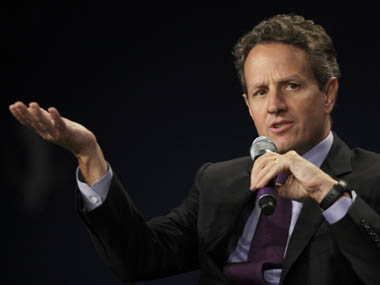US Treasury Secretary Timothy Geithner said on Tuesday that Europe was making gradual progress in coming to grips with its financial crisis but faces a complicated set of issues.
“Their basic challenge is how to make sure they stabilize their financial system and stabilize the ability of Italy and Spain particularly to make sure they can borrow at affordable rates but at the same time make … growth stronger,” Geithner told a conference sponsored by the Wall Street Journal.
“That’s a difficult balance and you can see they’re struggling with it but I think they’re gradually making progress,” he added.
[caption id=“attachment_132041” align=“alignleft” width=“380” caption=“US Treasury Secretary Timothy Geithner said on Tuesday that Europe was making gradual progress in coming to grips with its financial crisis but faces a complicated set of issues. Reuters”]  [/caption]
Geithner, who has visited Europe several times in recent months to talk with government officials and urged forceful action to cope with the sovereign debt crisis, reiterated that a solution was within their capacity.
“This is absolutely within Europe’s capacity to solve and it’s within their ability. It’s within their grasp, it’s within their reach,” he said.
“They have to figure out a way to get enough political support for what has to happen and they have to do it as quickly as possible so they don’t continually fall behind the curve of the market.”
Geithner said the United States has been “significantly affected,” as have economies around the world, by Europe’s crisis, and the Obama administration has “a big stake” in seeing Europe get ahead of its problem.
“We are helping both directly and indirectly through a range of things you know about, financially, and we have a lot of useful lessons from our experience,” Geithner said, referring to the 2007-2009 financial crisis that forced the government to take a series of extraordinary actions to prop up the economy.
But he stressed it was “Europe’s crisis” and it had to make its own choices about how to cope with it. “Again, we hope they make some progress more quickly.”
In response to questions, Geithner suggested the European Central Bank might be able to play a larger role. But he declined to say whether the central bank should be a buyer of last resort for bonds of troubled countries.
“I don’t want to get in the middle of that existential question for them,” Geithner said.
“But I would say … that there are lots of ways for the central bank to play a more effective supportive role in resolving this without violating the obvious constraints we respected here … for (the central bank’s) independence and making sure the central bank is not providing a direct source of financing for governments.”
Reuters


)
)
)
)
)
)
)
)
)



